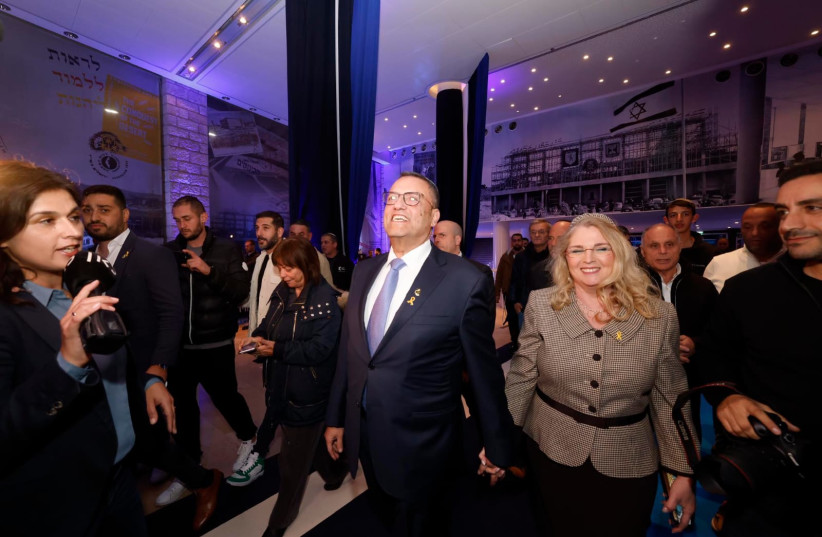Jerusalem mayoral incumbent Moshe Lion defeated challenger Yossi Havilio and will serve as Jerusalem's mayor for another five-year term, according to results from the interior ministry unit responsible for Israel's municipal elections, which were held throughout the country on Tuesday.
The results are in
According to the interim results that were true to 7:00 p.m. on Wednesday, Lion won 81.5% of the vote. This, however, does not include what are known as “double envelopes” – votes by soldiers, police officers, and others who could not vote in their assigned ballots. While Lion clinched the victory, the number is not final. Officials said that approximately 114,000 double envelopes had been cast.
In Tel-Aviv, incumbent Ron Huldai was re-elected after opponent Orna Barbivai conceded Wednesday morning. Huldai, 79, has served as the mayor of Tel Aviv since 1998. “Good luck to Ron Huldai who will continue to serve as mayor of Tel Aviv-Jaffa. Thank you to the great public who supported me and to all the partners along the way,” Barbivai wrote on X, formerly Twitter.
Mayoral candidates need to win at least 40% to win. If not, a second round will be held between the top two contenders on March 10.
Haifa heads to second round
Haifa is headed to a second round, as former mayor Yonah Yahav, who served as the city’s mayor between 2003-2018, only reached 36.2%. He will face David Etzyoni, who won 21.9% of the vote.
In Israel’s fourth major city, Beersheba, incumbent Rubik Danilovitz was not challenged and will serve another term.

In the haredi sector, Agudat Yisrael’s Hanoch Zeibart defeated Shas’s Uriel Busso, who is also currently Israel’s health minister, with 59% of the vote. Zeibart will become mayor for the second time, after serving as Bnei Brak’s mayor between 2013-2018.
Results in other municipalities
In a hotly contested race in Elad, Shas’s Yehuda Butbul won 55.3% of the vote, edging out incumbent Yisrael Porush, son of Jerusalem Affairs and Jewish Tradition Minister Meir Porush.
In Beit Shemesh, Degel Hatorah’s Shmuel Greenberg will go to a second round against incumbent Dr. Aliza Bloch. Bloch finished just ahead of Shas MK Moshe Abutbul by 0.5% of the city’s votes, which is approximately 275 votes.
In Safed, incumbent mayor Shuki Ohana, who was affiliated with the Likud, was defeated by a candidate from Shas, Yossi Kakon.
In the Arab sector, a former member of the Knesset from the Ra’am party, Mazen Ghanaim, won in Sahknin with 53.1% of the vote. In Tamra, Mussa Abu-Romi received 46.3% of the vote and defeated incumbent Suheil Diab. In Shfaram, Nahed Hazem was victorious with 46.1% of the vote, with incumbent Yasin Orsan finishing in fourth place with just 9%.
The Likud put out a statement on Wednesday praising a “giant victory for the Likud and the Right.” The party listed almost 40 municipalities in which the victor was supported by the Likud and also praised what it defined as the “moving of municipalities from Left to Right” in Holon, Yerucham, Arad, and other places.
Although the results were not yet final, Shas said in a statement on Wednesday evening that it had gained 47 municipal council seats altogether throughout the country. Shas held a party meeting at the Knesset on Wednesday and hosted its two mayor-elects from Elad and Safed.
Yesh Atid chairman, opposition leader MK Yair Lapid, commended on Wednesday morning representatives of the party winning in 11 cities or towns, including Hod Hasharon, Kiryat Ono, and the Druze town Majdal Shams. Lapid said in a statement that his party has increased its representation in over 40 municipal councils, and in many of them, including in Tel Aviv, it became the largest faction. Lapid said that this was “further proof of the growing power of Yesh Atid in Israeli society and of the liberal camp,” and also commended the “large number of women who were chosen to lead.”
“Israel needs change. We started with the local government, and we’ll continue with the national government,” Lapid said.
Religious Zionist Party (RZP) chairman, Finance Minister Bezalel Smotrich, also expressed on Wednesday morning his satisfaction with the results. In a post on X, Smotrich said that there had been a “record achievement” of dozens of the party’s representatives across the country.
“As many of them (RZP candidates) served the country in recent months on the war front, so too in the coming years they will loyally serve in the local authorities, with God’s help,” Smotrich said.
Voters on Tuesday also cast ballots for city councils, and not just for the mayorship.
In Jerusalem, haredi representatives in the previous election had 15 out of the city council’s 31 seats. The city council results were not announced on Wednesday, but the tally of votes, not including the double envelopes, appear to have given the haredi parties 16 or 17 seats, and thus a majority in the council’s plenum.
